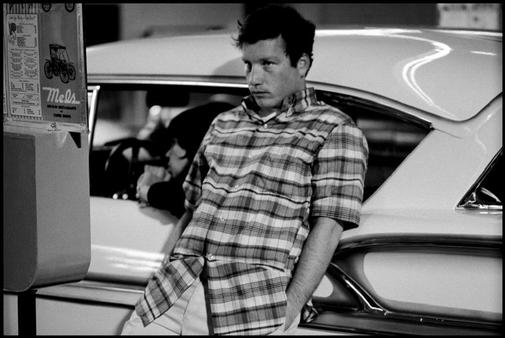Even though
actor, Richard Dreyfuss had already been working for years on stage, on TV, and
in movies, his first widespread movie recognition came in 1973, with American
Graffiti. The endearing & nostalgic film, directed by George Lucas,
was an enormous hit. It grossed $115 million which, according to Box
Office Mojo, is the monetary equivalent of more than $500 million when
adjusted today for inflation. Yet, despite
being praised by others and giving an excellent performance in the film,
Dreyfuss did not like his contribution when he first saw it. He once told
George Lipton of The Actors Studio, “I
watched the movie the first time in a work print. During one of the work
sessions I wasn’t expected that night I just showed up. I was seeing myself on
a large [screen] for more than a minute and a half. And, when the film was over George said,
“What’d you think?” Looking at the floor and in a low voice Dreyfuss replied,
“Well, I think, it’s a very good movie and I think you should cut me out of the
film, and I know how to do it.” [laughing] I was totally crazed!
 |
| As Durf the Drag on the 1960's teen sitcom, Gidget starring Sally Field. |
Soon after the film first opened, Cindy
Williams, who played Laurie, and Charles Martin Smith, who portrayed Terry “The
Toad,” went to Westwood, CA to see the low-budget (aprox $750,000) comedy. "There were lines around the
block," Williams remembered.
"I called Richard Dreyfuss, who was doing 'The Apprenticeship of Duddy Kravitz' in Canada, and I told him. He
didn't believe me. He thought I was making it up. They let Charlie and me in,
and we had to sit on the floor in the back. It played a year in Westwood!"
 |
| My personal autographed publicity still |
In a recent interview with movie critic,
Peter Howell, the legendary actor said he was
initially attracted to his role because of the character’s
self-awareness. “When George Lucas was
casting for that film, he told me I could play either Curt or the little guy
(Ron Howard’s role). I said, “I want to play Curt, because he’s reflective, Dreyfuss recalled. He
knows that 20 years from now, he will remember that night. He knows it. So I
want to play that.” The actor’s love of portraying a character with
personal insight is conveyed in his amazing ability to portray such a person -
one who possesses a clear perception of himself and life around him.

Dreyfuss’ performance in Graffiti brilliantly conveys the personality of a kid who is hyper-aware of the fact that he is experiencing the last night of his carefree teenage life and is cherishing the moment in time as it is happening. An example of this is the scene in the film where he’s walking down the hall of his former high school and he tries to open up his locker but the number combination has already been changed. “You could see him doing it smiling and remembering it, filing it away,” Dreyfuss recalled. I think of all the characteristics that I like to play as an actor, self-awareness is the top. There are characters I’ve played that don’t have it but that’s what I enjoy playing the most.

Epilogue:
Candy Clark who portrayed Debbie in American Graffiti read the above post and sent me a comment stating that Dreyfuss was having difficulties in his personal life at the time of making the film. "Richard
was very depressed on the movie," Candy recalled. "His girlfriend had broken up with him
and he spent a lot of time in his hotel room crying. This is probably
what tainted his perception of his performance. Actually he is super in
the movie. He just couldn't see it at the time."
NOTES
____________________________________
- Howell, Peter. (June 03, 2013) “Richard Dreyfuss the proud canuck from Brooklyn.” The Star.com. Retrieved 8/21/2013. http://www.thestar.com/entertainment/movies/2013/06/03/richard_dreyfuss_the_proud_canuck_from_brooklyn.html
- King, Susan (July 29, 2013) “Oscars outdoors goes to the drive-in with American Graffiti.” Los Angeles Times. Retrieved 8/21/2013. http://www.latimes.com/entertainment/movies/moviesnow/la-et-mn-oscars-outdoors-classic-hollywood-20130729,0,5799727.story
- Richard Dreyfuss on Inside the Actors Studio. Hosted by James Lipton. Season 7, episode 4. Original airdate December 03, 2000.



Richard appears to be remembering his own past in this touching story of a young boy coming of age. It appears that Mr. Dreyfuss is attempting to reach back into his own sorted youth to rekindle, if you will, his lack-luster current career. For years, he shunned and and all references to American Graffiti and yet now, it seems he can't forget his pivotal role. Ending this article with a cartoon of a woman lying naked also brings about feelings of a misspent youth, and spending afternoons teasing all the neighbors.
ReplyDeleteGood article, Kip! I love it!